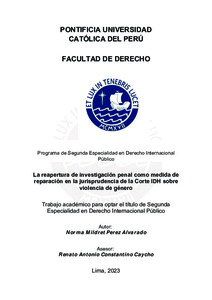La reapertura de investigación penal como medida de reparación en la jurisprudencia de la Corte IDH sobre violencia de género
Abstract
Este artículo realiza un análisis de las decisiones de la Corte Interamericana de
Derechos Humanos (Corte IDH) de admitir o rechazar la reapertura de juicios penales
como medida de reparación en casos de violencia basada en género. El texto revisará
casos de violencia basada en género en los que la Corte IDH ha otorgado y no ha
otorgado dicho remedio en particular, con el fin de identificar los criterios que utiliza para
tomar postura. De una evaluación comparada, se extrae que la Corte IDH ha adoptado
una tendencia a estimar procedente la reapertura cuando medien situaciones de
violencia basada en género en el marco de graves violaciones de derechos humanos
durante épocas de conflicto armado no internacional, y como parte de políticas estatales
de violencia sistemática. En cambio, en aquellos casos de violencia basada en género
donde no se cumplan tales condiciones de hecho, la respuesta de la Corte IDH ha sido
de oponerse a dicha solicitud de remedio. Concluiré que la Corte IDH otorga una mayor
importancia de afianzar el derecho a la verdad para los casos del primer tipo; y,
consecuentemente, se permite limitar ciertas instituciones del derecho penal que entran
en tensión en dichos escenarios. This article analyzes the decisions of the Inter-American Court of Human Rights
(IACtHR) to admit or reject the reopening of criminal trials as a measure of reparation in
cases of gender-based violence. The text will review cases of gender-based violence in
which the IACtHR has granted or refused to grant this particular remedy, in order to
identify the criteria it uses to take a position. From a comparative evaluation, it can be
seen that the IACtHR has adopted a tendency to consider reopening to be appropriate
in situations of gender-based violence in the context of gross human rights violations
during times of non-international armed conflict, and as part of state policies of
systematic violence. On the other hand, in those cases of gender-based violence where
such de facto conditions are not met, the response of the IACtHR has been to oppose
such request for reparation. I will conclude that the IACtHR attaches greater importance
to upholding the right to the truth in cases of the first type; and, consequently, allows
itself to limit certain institutions of criminal law that come into tension in such scenarios.
Temas
Violencia contra la mujer--América Latina
Corte Interamericana de Derechos Humanos--Jurisprudencia
Resarcimiento (Justicia penal)--América Latina
Corte Interamericana de Derechos Humanos--Jurisprudencia
Resarcimiento (Justicia penal)--América Latina
Para optar el título de
Segunda Especialidad en Derecho Internacional Público





